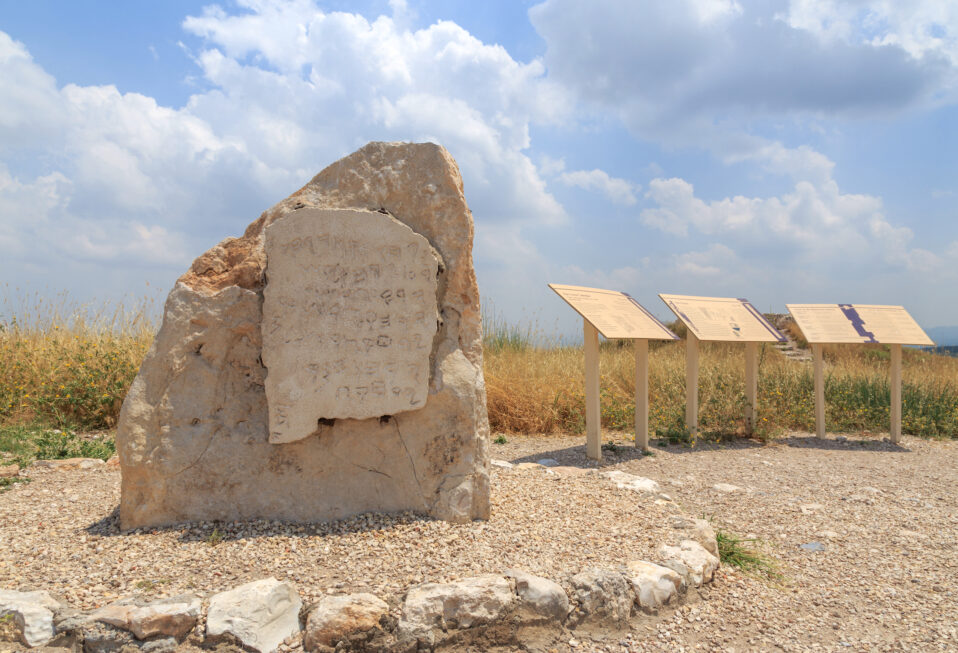Gezer sat an important geographic juncture between the Coastal Plain (the Plain of Philistia and the Sharon Plain) and the Aijalon Valley. It guarded a stretch of the international coastal highway that connected Egypt with Damascus and Mesopotamia; this was the most important route in the Ancient Near East.
The Aijalon Valley offers an east-west corridor from the Coastal Plain through the Judean lowlands into the Central Hill country. Gezer sat at this juncture protecting the international coastal highway as well as the inland route into the Judean highlands. It was an important regional hub.
According to the book of Joshua, Joshua defeated the king of Gezer (10:33). Gezer remained a Canaanite city throughout the period of the Judges (Joshua 16:10; Judges 1:29). David fought against the Philistines near Gezer (2 Samuel 5:25; 1 Chronicles 20:4). The Egyptian Pharoah gave Gezer as a dowry to Solomon for marrying his daughter.
The biblical text mentions Gezer most prominently with Solomon’s building efforts (1 Kings 9:15-17). Solomon fortified Gezer along with Megiddo and Hazor; all three cities guarded stretches of the international coastal highway between Egypt and Mesopotamia. By the biblical writer mentioning Solomon’s building up of these three cities, he communicated the strength of Solomon’s kingdom along this very important international highway.
Like Megiddo and Hazor, Gezer, which was a very significant regional hub within the Levant (modern day Lebanon, Syria, Jordan, Israel, and the West Bank), was not mentioned often within the Bible. The lack of mention of these cities within the biblical text does not correspond to their regional importance; rather, it reflects the reality that the Israelites rarely exerted control over these cities.
The site of Gezer consists of two hills, an eastern hill and western hill connected by a low saddle. Excavations reveal that Gezer reached its zenith in the Middle Bronze Age (1950-1550 B.C.). The city had large walls and fortifications during this period. Excavations uncovered a high place of ten monolithic standing stones, which could be used to commemorate an event, as burial markers, or a covenant relationship (see Genesis 28:18-22; 35:9-15, 19-21; and Exodus 24:3-8); these monoliths stand in the saddle that connected the two hills.
In the 10th century B.C., Gezer was refortified with a six-chambered city gate attached to the city wall. Each chamber of the gate contained plastered benches. This underscores that gates within Iron Age cities were not merely for entering and exiting the city, nor solely the city’s defense, but they served as a meeting place, a place where the city elders sat to judge the affairs of the people, as well as a market and gathering place of the people (see Deuteronomy 21:19; Ruth 4:1-11; 1 Kings 22:10; 2 Kings 7:1; Amos 5:10, 12; Isaiah 29:21; Jeremiah 38:7; 2 Chronicles 32:6).
The Iron Age settlement also had a water system hewn into the bedrock with stairs also hewn into the rock descending into it. The campaign in Judah of Pharaoh Sheshonk I apparently destroyed Gezer in the late 10th century B.C. The city was rebuilt, but was destroyed again in the 8th century B.C., probably as a result of the campaign of the Assyrian king Tiglath-pileser III (733 B.C.). Gezer remained settled in the Persian and Hellenistic periods, with its final period of settlement being during the Hellenistic period.
Marc Turnage is President/CEO of Biblical Expeditions. He is an authority on ancient Judaism and Christian origins. He has published widely for both academic and popular audiences. His most recent book, Windows into the Bible, was named by Outreach Magazine as one of its top 100 Christian living resources. Marc is a widely sought-after speaker and a gifted teacher. He has been guiding groups to the lands of the Bible—Israel, Jordan, Egypt, Turkey, Greece, and Italy—for over twenty years.
Website: WITBUniversity.com
Facebook: @witbuniversity
Podcast: Windows into the Bible Podcast




Comment(1)-





Roy sapp says
November 16, 2023 at 11:58 amThanks for sharing
Receive Devotionals and News Updates from Israel
Recent Posts
Weekly Devotional: When Living Water Flows
Faith in Action: How American Christians Can Stand with Israel Today
American and Israeli Eagles in the Storms of Life
Bringing Hope to Missile Strike Survivors